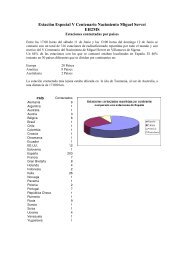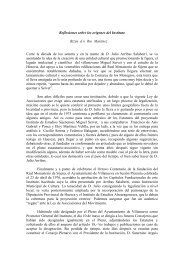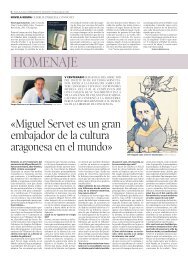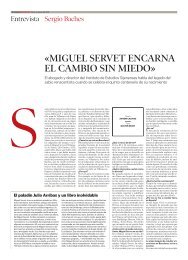New Page
New Page
New Page
You also want an ePaper? Increase the reach of your titles
YUMPU automatically turns print PDFs into web optimized ePapers that Google loves.
This tendency can be observed in the work that introduced the new Christology in Hungarian, but<br />
the refutation of disputes is even stronger with Dávid, especially in the last part of the work, subtitled<br />
Tanácsadás [Counsel]. It is particularly interesting how the author refers to +simple people". Let the following<br />
passages be an illustration, even at the price of possible arbitrariness. +...What use is to our salvation<br />
even if we understood what God is in His essence, and in what way those three persons are in one<br />
essence..." +Even if these were true and even if we understood them, these are not necessary for our<br />
salvation, so why are we fighting, filling the whole world with steel and fire when these cannot be found<br />
in God's word?..." +If this undescribable confusion, namely the one about this God of one essence, three<br />
persons and the origin attributed to the Holy Ghost were put in the way of salvation, no one would have<br />
been able to reach salvation for all have been disputing about these things so far and yet it is to be decided<br />
by the judge (my italics, M. B.)". +And the simple people, who know not the alphabet, should take the<br />
Apostolic Creed and the prayer made by Christ..."68<br />
This effort to play down the significance of the debates is undoubtedly a propagandistic device<br />
meant to break way in the direction of biblicism, which provided more favourable circumstances for<br />
Antitrinitarians. (The reference to the Apostolic creed and to +the prayer made by Christ" makes this<br />
quite obvious.) On the other hand, these sentences argue with the enthusiastic optimism manifest in the<br />
Preface of Refutatio scripti Petri Melii and in the whole of Rövid magyarázat, especially with the<br />
prediction of the empire of peace for 1570. For, according to the clause italicized above, quick victory<br />
over the Sophists was not expected and a certain transcendence over his own position can also be perceived<br />
there. For at least a moment Dávid views his own polemics from the outside. I would not say that<br />
this, with regard to the whole work, rather hidden mentality could be identified with the humanist<br />
skepticism of Dávid's sources (to be considered later), but it is not identical with the agnosticism,<br />
common among Antitrinitarians, that legitimizes extreme biblicism. It is of course out of the question for<br />
him to consider the debates around Trinity adiaphoron but the momentary +transcendence" over the<br />
squabbles is worth mentioning. It should also be pointed out that this voice is completely alien to<br />
Grzegorz Pawel, the fanatic leader of the Polish Antitrinitarians.<br />
In the concluding section of Tanácsadás, however, the optimistic voice expecting the coming of<br />
the victorious Christ returns. He will be greeted by the steadfast believers +with joyous faces and clear<br />
conscience". It is also added, probably repeatedly announcing either Rövid útmutatás or De falsa et vera,<br />
that +from the will of God we shall show with our published writing on a day before long that this is so,<br />
and shall explain the writings that are made by force for the defense of their opinions."69<br />
Differences and parallels in the vernacular propaganda in Transylvania and in Poland<br />
Rövid útmutatás, the other Hungarian work Ferenc Dávid published in 1567 has hardly been discussed<br />
in the literature on the subject, although its thorough analysis will yield lessons that are very important<br />
not only for Transylvanian but European Antitrinitarianism as well. An outline of these, on the<br />
other hand, will require the consideration of other texts related to, or touching upon, it. We have in mind<br />
primarily the chapter entitled De discrimine legis et euangelii in De falsa et vera and Grzegorz Pawel's<br />
Rozdzial Starego Testamentu od Nowego.<br />
The chapter of De falsa et vera in question discusses an issue that goes beyond the problematics<br />
concerning the Trinity in the strict sense but is connected to it most organically. For the denial of Christ's<br />
preexistence necessarily meant that the followers of the movement had to think about the state of God-man<br />
relationship before and after Christ, the possibilities of justification and the relationship of the two<br />
testaments. The chapter De discrimine legis et euangelii, very significant in its brevity, discusses these<br />
24







